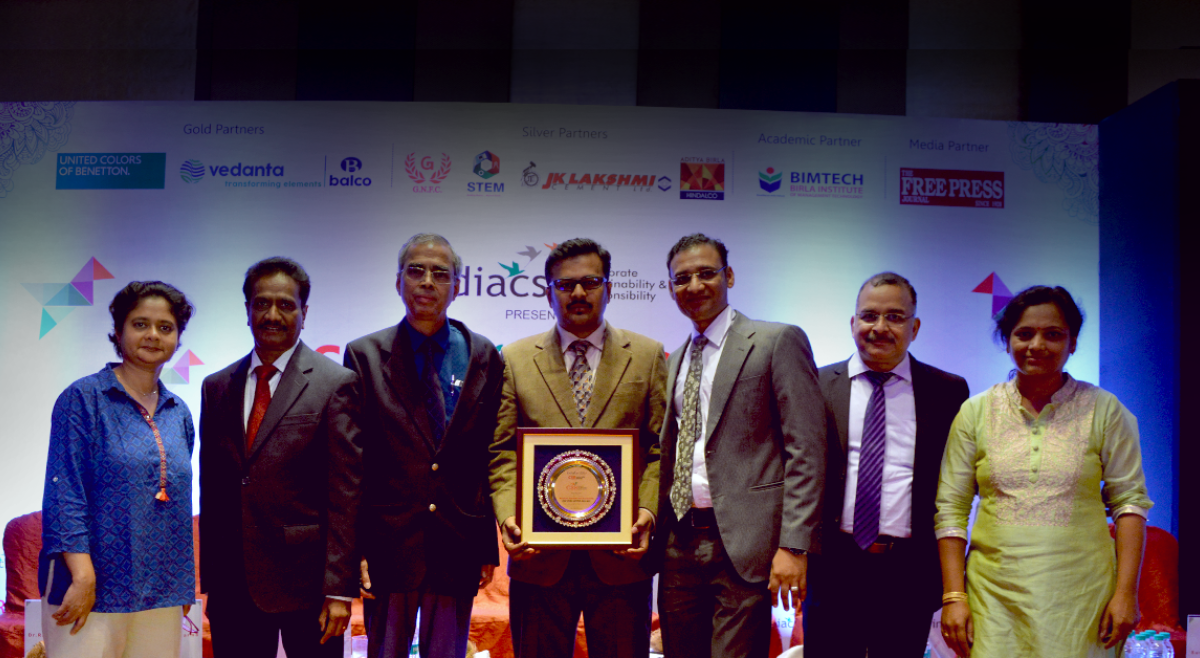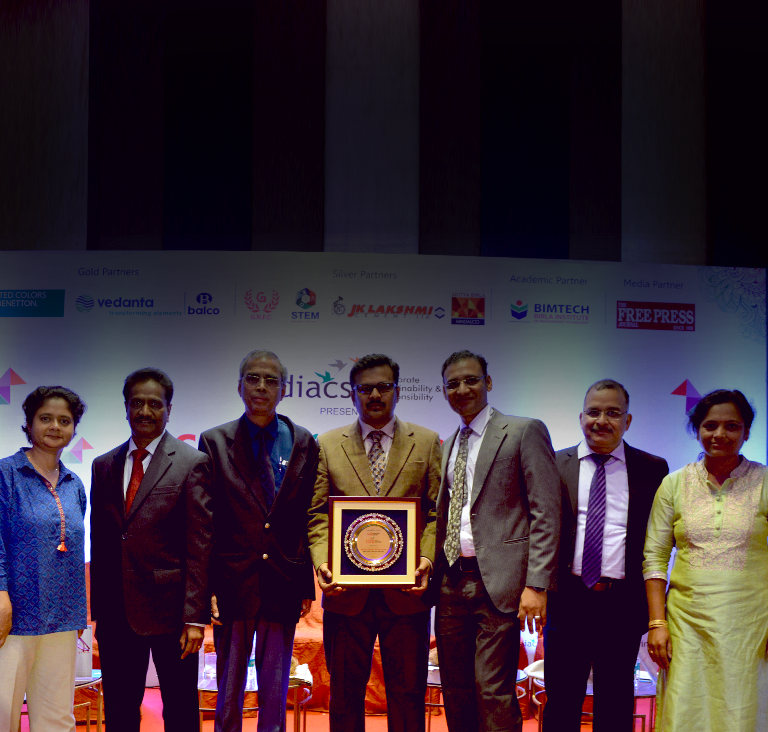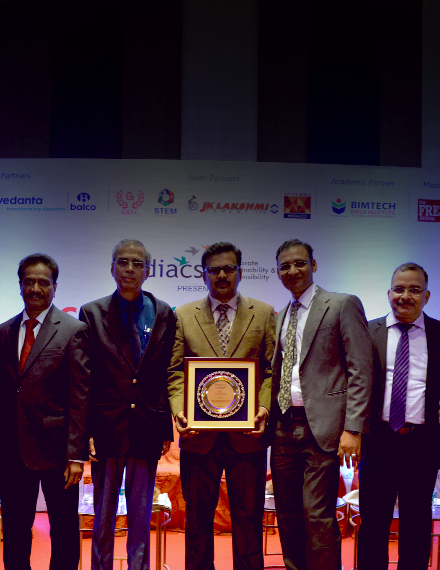JSW's CSR Efforts Wins Another Accolade
We are proud to announce that our JSW CSR’s Vijayanagar team led by Dr. Srinivas Kedar, Chief CSR Officer - JSW Foundation, received the India CSR Project of the Year Award for the ongoing ‘Mission Against Malnutrition’ project in Ballari by Mr. Ramdas Athawale, Honourable Minister of State for Social Justice and Empowerment, Government of India.
The annual award is given by Corporate Sustainability & Responsibility (CSR) news portal : ‘India CSR’, one of the largest gathering of CSR professionals, experts and NGOs in the country. Top business leaders graced the India CSR Leadership Summit in Mumbai on May 26, 2017 at Hotel Sahara Star.
The Jury awarded JSW for the unique ‘Mission Against Malnutrition’ project that is fighting against malnutrition and facilitating radical changes in the practice and policy framework in curbing the issue completely. This project impacts and transforms lives of over 40000 women and children in Ballari district of Karnataka.
The jury appreciated the process of administering, tracking and validating the intake of Spirulina, an algae based food fortification recognized by World Health Organisation.
Mission Against Malnutrition (MAM) Project
An initiative of the JSW Foundation in partnership with the Department of Women and Child Development, Government of Karnataka
Interview with Dr. Srinivas Kedar, Chief CSR Officer- JSW Foundation
-
Among so many pressing social issues, how did we decide to address Malnutrition?
-
What makes 'Mission Against Malnutrition' project uniquely positioned among similar projects administered by the government and NGOs?
-
It used Spirulina, blue-green algae (an ancient cyanobacterium) which is a natural food supplement, as micro-nutrient supplement and not any synthetic supplements available in market. Spirulina is a natural food well known for its nutritional qualities worldwide. It is basically chosen because while it can provide several important micronutrients required by children’s healthy growth and development, it can also be easily cultivated and processed locally by the local communities. And Spirulina is approved in India as a food supplement by the Food Standards and Safety Authority of India (FSSAI) and categorized as a nutraceutical ingredient by the Government of India. It is low cost, easy to produce, has long shelf life, easy to store and transport. Importantly, quality standards are prescribed and labs are there to test. National level top research institutions like CFTRI, NIN, NRDC, etc., do advocate Spirulina use.
-
The MAM project approach advocates supplementing and complementing the Home + ICDS food and not a standalone intervention: The moderately malnourished children were supplemented with 5 grams of SFS per day for 180 days and severely malnourished with 10gms per day. While Home + ICDS food was geared towards addressing Protein and Carbohydrate deficiencies, the SFS was brought in for addressing micro-nutrients deficiencies.
-
Execution efficiency: Mission team evolved an appropriate approach that enabled multi-partners pitching in at right time. It enabled Project Management Unit (PMU) to leverage a combined and collective effort. The Mission approach has brought together the Department of Women & Child Development, Government of Karnataka, CSRs like JSW Foundation and Supraja Foundation, NGOs like Spirulina Foundation, Bhoruka Charitable Trust, Pranati, Charitable Trust For Integrated Development, reputed research institutes like CFTRI, Mysuru, IHMR-Bengaluru, Vijayanagara Institute of Medical Sciences (VIIMS)-Ballari, Department of Social Studies, VSK University and management agency like IID, Bengaluru on board.
-
With 30,716 malnourished children (between the age group of 6 months to 6 years) and another 15,000 anemic pregnant women, lactating mothers and adolescent girls being supplemented with Spirulina during a pilot Mission phase of 3 years, this is the single largest ‘mission’ against malnutrition conducted globally.
-
A dramatic reduction in the levels of malnutrition was observed; up to 42% reduction in the number of malnourished children during 2014-16 and 45.3% reduction in 2016-17 trials. The hypothesis is now being supported by significant data, scientific studies, third party evaluation and clinical research conducted during the phase.
-
In an independent and non-randomised study conducted by the Institute of Health Management and Research, Bengaluru, of 1000 children, a 46% and 67% reduction in malnutrition was evidenced among children who received 5 and 10 grams of SFS, respectively, as compared to little change in the control groups. A significant cognitive improvement and alleviation of biochemical micronutrient deficiency was noted among children who received Spirulina.
-
What were the key observations of India CSR team when they visited Ballari to review the malnutrition project for the award evaluation?
-
“Indeed, MAM is impressively a large social impact project”
-
“MAM is a well-conceived, well-planned and well-executed project”
-
“It was a learning experience for ourselves to understand the scale, intensity and the enthusiasm with which Dr. Kedar and his team delivered the results on ground.”
-
Highlight the impact of the project - both outreach numbers and scientific validation, so far
-
During June 2014 when the pilot Mission was launched in Sanduru block; as per Department report, the rate of malnourished children was 45.6% and by June 2016, (the end of the Sanduru pilot) it got reduced to 26%, a record drop of 43% during these two years. Whereas the same for the previous two year (June 2012-14 was just 1.1%. Parallel to this regular Departmental monitoring, the Mission team also tracked one third of the children under pilot from start month to end of 6th month and noted that 42% children come out of malnutrition state. The same for Hosapete and Kudligi taluks, the adjacent blocks of Sanduru during 2016-17 trials, the drop recorded to 45.3%.
-
Internationally known research agency, Institute of Health Management & Research (IHMR), Bengaluru, undertook an independent study which showed substantial reduction in under-weight prevalence; up to 67% with 10 gms and up to 46% with 5 gms of SFS Supplementation. The study also observed significant improvements in biochemical levels of iron, vitamin A, hemoglobin as well as immunity and also noticeable progress in cognitive development of those children.
-
Vijayanagara Institute of Medical Sciences (VIMS), Ballari, conducted third party evaluation 6 months post the mission intervention and they reported that 24% of children being still normal indicating the sustainability of outcomes.
-
Shri Krishnadevaraya University (VSKU), carried out a study on the socio-cultural impact of the Mission. Their findings reveal that the Mission has impacted the community deeply with regard to malnutrition and there is a wide acceptance of SFS supplementation. And also acceptable to children
-
Roadmap for the next five years






